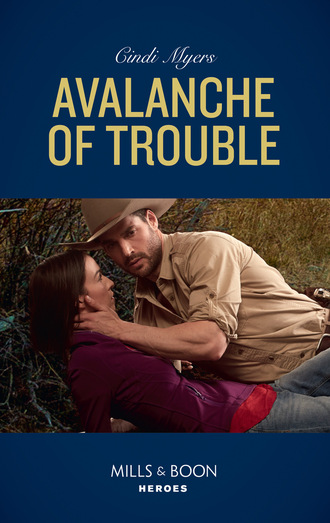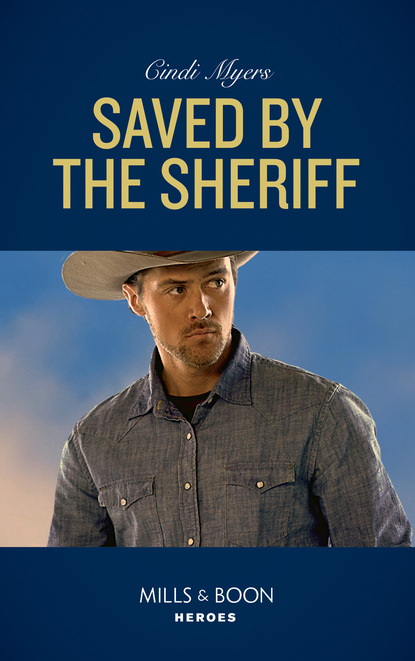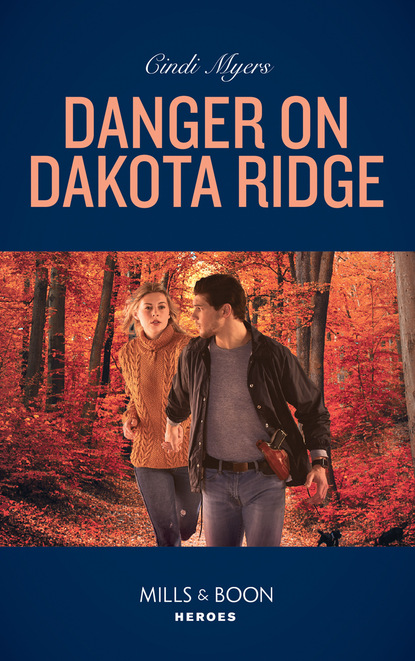
Полная версия
Avalanche Of Trouble

A CHILD WITNESSES A MURDER
AND BECOMES A KILLER’S TARGET...
Murder doesn’t belong in the peaceful town of Eagle Mountain, Colorado. Yet Deputy Gage Walker has a brutal double murder on his hands and a missing deaf child. Gage’s only hope to find the little girl is her aunt, Maya Renfro. But nothing has prepared Gage for the intense chemistry between them...or just what happens when love gets mixed with murder.
Eagle Mountain Murder Mystery
CINDI MYERS is the author of more than fifty novels. When she’s not crafting new romance plots, she enjoys skiing, gardening, cooking, crafting and daydreaming. A lover of small-town life, she lives with her husband and two spoiled dogs in the Colorado mountains.
Also by Cindi Myers
Saved by the Sheriff
Murder in Black Canyon
Undercover Husband
Manhunt on Mystic Mesa
Soldier’s Promise
Missing in Blue Mesa
Stranded with the Suspect
Colorado Crime Scene
Lawman on the Hunt
Christmas Kidnapping
Discover more at millsandboon.co.uk
Avalanche of Trouble
Cindi Myers

www.millsandboon.co.uk
ISBN: 978-1-474-07916-7
AVALANCHE OF TROUBLE
© 2018 Cynthia Myers
Published in Great Britain 2018
by Mills & Boon, an imprint of HarperCollins Publishers 1 London Bridge Street, London, SE1 9GF
All rights reserved including the right of reproduction in whole or in part in any form. This edition is published by arrangement with Harlequin Books S.A.
This is a work of fiction. Names, characters, places, locations and incidents are purely fictional and bear no relationship to any real life individuals, living or dead, or to any actual places, business establishments, locations, events or incidents. Any resemblance is entirely coincidental.
By payment of the required fees, you are granted the non-exclusive, non-transferable right and licence to download and install this e-book on your personal computer, tablet computer, smart phone or other electronic reading device only (each a “Licensed Device”) and to access, display and read the text of this e-book on-screen on your Licensed Device. Except to the extent any of these acts shall be permitted pursuant to any mandatory provision of applicable law but no further, no part of this e-book or its text or images may be reproduced, transmitted, distributed, translated, converted or adapted for use on another file format, communicated to the public, downloaded, decompiled, reverse engineered, or stored in or introduced into any information storage and retrieval system, in any form or by any means, whether electronic or mechanical, now known or hereinafter invented, without the express written permission of publisher.
® and ™ are trademarks owned and used by the trademark owner and/or its licensee. Trademarks marked with ® are registered with the United Kingdom Patent Office and/or the Office for Harmonisation in the Internal Market and in other countries.
www.millsandboon.co.uk
Version: 2020-03-02
MILLS & BOON
Before you start reading, why not sign up?
Thank you for downloading this Mills & Boon book. If you want to hear about exclusive discounts, special offers and competitions, sign up to our email newsletter today!
SIGN ME UP!
Or simply visit
signup.millsandboon.co.uk
Mills & Boon emails are completely free to receive and you can unsubscribe at any time via the link in any email we send you.
For my nieces, Morgan and Kelli
Contents
Cover
Back Cover Text
About the Author
Booklist
Title Page
Copyright
Dedication
Chapter One
Chapter Two
Chapter Three
Chapter Four
Chapter Five
Chapter Six
Chapter Seven
Chapter Eight
Chapter Nine
Chapter Ten
Chapter Eleven
Chapter Twelve
Chapter Thirteen
Chapter Fourteen
Chapter Fifteen
Chapter Sixteen
Chapter Seventeen
Chapter Eighteen
Chapter Nineteen
Chapter Twenty
Chapter Twenty-One
Extract
About the Publisher
Chapter One
Gage Walker wouldn’t have said he was a superstitious man, but he didn’t believe in tempting fate. Don’t brag about your bank account being full or a big bill will surely show up in the mail that will tap you out. Don’t plan a fishing trip in April and leave the rain gear at home just because it was sunny when you left the house. Don’t complain about being bored at work or you’ll get a call that will have you working overtime for the next week.
When your work was as a sheriff’s deputy in a small, rural county, boring was good, or so he always reminded the rookies and reserve cops. Boring meant crime was down and people were happy. The adrenaline rush of a real crime might make your day go faster, but it also meant someone was hurt, or had lost something valuable to them, or, worst of all, someone was dead.
The man and the woman in this camp up near Dakota Ridge were definitely dead, each shot in the back of the head, execution-style. They were both in their early thirties and had probably been a nice-looking couple before someone had tied their hands behind their backs and sent a bullet through each of their brains. The driver’s license in the man’s wallet identified him as Greg Hood, from Denver.
Judging by the matching gold wedding bands they wore, Gage guessed the woman was Greg’s wife. The couple hadn’t been killed for money. The man’s wallet still had cash and credit cards in it, and in addition to the wedding rings, they both wore expensive-looking watches. They had been left lying on the forested floor between their tent and the cold remains of a campfire, eight miles from the nearest paved road, about a hundred yards from the late-model SUV registered in their name.
“Creepy.” Gage’s fellow deputy, Dwight Prentice, came to stand next to Gage, staring down at the bodies. Dwight looked around them, at the still forest, lodgepole pine and aspen so thick in places a man could scarcely walk between the trunks, the evergreen-scented air now tainted with the stench of death.
“Yeah, it’s creepy,” Gage said. “If someone had it in for these two, why not kill them in Denver?” To his way of thinking, murder belonged in the city, not in the peaceful mountains where he had been born and raised and made his home.
Though he had been a member of the Rayford County Sheriff’s Department for four years now, Gage hadn’t seen death like this before. People in Eagle Mountain—the county’s only town—died peacefully of old age, of diseases or a heart attack, or maybe after a fall while climbing or hiking in the surrounding mountains. A little over three years ago, a young lawyer in town had been murdered. People still talked about that case; it had been so unusual for the quiet community that primarily made its living from tourists.
This case was going to give everyone something more to talk about. “I’ll drive down in a few minutes and call this in,” Gage said. No company had thought it worthwhile to build cell towers on Dakota Ridge, so this corner of the sheriff’s department jurisdiction had no coverage, and the radio wasn’t much more reliable. Besides, talking about something like this over the radio pretty much guaranteed that half the town would know about it, since so many of them made a hobby out of listening to police scanners. They would be out here to sightsee before the crime scene techs had even finished pulling on their Tyvek suits.
“I want to have another quick look around first.” This was his last chance to size up the scene for himself, before the techs and photographers, ambulance personnel and reporters trampled everything into dust. Oh, they’d do all the right things—cordon off the scene and establish an entry corridor—but never again would the scene look like this, unmarred by tape and markers and footsteps.
Moving carefully, Gage stepped around the tent and bent down to look inside. “Who called this in, do you know?” Dwight asked. He remained standing near the bodies.
“Milo Werth called it in,” Gage said. “Said he saw the car parked here two days ago when he delivered propane to Windy Peak Ranch, at the end of the road. He came by this morning to pick up a heeler pup Jim Trotter at Windy Peak had for sale and said the car looked like it hadn’t moved. With the pup and his little boy in the truck, he didn’t want to stop and look, but thought we should check it out.” He unhooked the collapsible baton from his utility belt and extended it, then used it to pull back the tent flap.
Inside was a jumble of sleeping bags, a plastic tote with a lid, and a scattering of clothes. A battery-operated lantern hung from a hook at the center of the tent’s dome, and a backpack sat propped to the left of the door. Then he spotted a woman’s purse next to the backpack. He pulled out a camera and took a picture of it in place, then pulled on latex gloves and, using the baton, hooked the straps of the purse and carefully lifted it out.
“Looking for ID?” Dwight asked.
“I’m looking for anything that tells me why they were up here.”
“That’s easy enough to figure out,” Dwight said. “They came up here to camp. A nice break from city life.”
“Except this isn’t National Forest or BLM land,” Gage said as he pulled a red leather wallet from the purse. “This is private property. This whole area is patented mining claims.”
“Maybe they didn’t know that,” Dwight said. “Maybe they thought they could pull over anywhere and camp. Nobody bothered them, so they thought it was all right.”
“Maybe.” The sheriff’s department had been called in before to explain to clueless campers that even if the land they were on wasn’t occupied, it wasn’t free for them to set up camp. Gage opened the wallet and studied the driver’s license in the little plastic window opposite the checkbook. Angela Hood had been a pretty brunette with long, straight hair, green eyes and a wide smile. She was thirty-two years old, five feet five inches tall. Gage flipped through the credit cards and store loyalty cards in their clear plastic sleeves next to the license and stopped when he came to a bright yellow card. In Case of Emergency, Contact Maya Renfro, (sister). A phone number and address were neatly printed in the space below.
Gage made note of the number, then dropped the wallet back into the purse and replaced the purse inside the tent. “I got a number for her emergency contact,” he said. “Looks like it’s her sister.”
“You could let Travis contact her.” Travis Walker was the Rayford County sheriff—and Gage’s older brother.
“No, I’ll do it,” Gage said. Not that he looked forward to telling a woman her sister had been murdered, but he hoped Maya Renfro could lend some insight into what Angela and Greg had been up to that might have gotten them killed.
He made his way back around the tent to the rough track that led into the clearing. “I’ll be back as soon as I make the call,” he told Dwight.
“I’ll be here.”
Gage took another look at the SUV parked at the road—a dirty white, late-model Chevy with a cooler and a black plastic garbage bag in the rear compartment. The couple had probably stashed the food and garbage there as a precaution against bears, which showed they were savvy campers. The techs would go over the vehicle, but to Gage, it looked as if it hadn’t been touched. And he spotted no other shoe or tire impressions in the soft soil on the verge of the road. So how had the killers gotten to the site?
He went over the details of the crime scene in his head as he drove the eight miles back to the highway. Once he had a strong phone signal, he parked on the shoulder and called the sheriff’s department. “Gage, I’ve been calling you for the last half hour. Where have you been?” Adelaide Kinkaid, the police department’s office manager, or, as she liked to refer to herself, “the woman who keeps everything going around here,” addressed Gage as if he was a sixteen-year-old delinquent instead of a twenty-five-year-old cop. But Adelaide talked to everyone that way. It was part of her dubious charm.
Gage ignored her question. “Is Travis in?”
“No, he is not. When I couldn’t get hold of you, he had to go over to the high school to take a theft report.”
“Fine. I’ll call his cell.”
“But where—”
Gage ended the call. Later, he would no doubt get a lecture from Adelaide about it being his responsibility to keep her informed of his whereabouts, but annoying her now was worth a little aggravation later.
Travis answered Gage’s call on the second ring. “What’s up?” the sheriff asked. Two years older than Gage, he had won a hotly contested election two years previously to become the youngest county sheriff in Colorado. Since then, even the detractors who had tried to hold his youth against him had admitted to being impressed with his performance. Gage hadn’t been surprised at all—Travis had always been the more serious and determined of the three Walker siblings. Gage, though equally smart and athletic, preferred a more laid-back approach to life.
But there was nothing laid-back about his current situation. “We’ve got a mess on our hands,” he said. “That abandoned car Milo Werth called in belongs to a young couple who got themselves killed up on Dakota Ridge.”
“Killed?” A sound like Travis closing a door. “How?”
“Shot in the back of the head. Execution-style—hands tied behind their backs. Greg and Angela Hood, from Denver. They were camping on land up there—probably a mining claim.”
“Who owns the claim?” Travis asked.
“I haven’t got that far yet. We need to call in the crime scene techs. And depending on what they find, we may need to get some help from the state. Everything about this feels bad to me.”
“I’ll call CSI as soon as we get off the phone,” Travis said. “You head back up there and guard the crime scene.”
“Dwight’s up there now. I found a next of kin notification card in the woman’s wallet. I figure I’ll make that call before I head back up. Says it’s her sister.”
“Hard,” Travis said.
“Yeah, but it needs to be done. And if it was our sister, I’d want to know right away.”
“Agreed,” Travis said. “Fortunately, I talked to Emily this morning. She was on her way to class.” Their baby sister was working on her MBA in economics at Colorado State University.
“Good to know. Tell the forensics team there’s a pull-off just after mile marker eight. I want it checked for any tire impressions or other evidence. There aren’t any signs near the Hoods’ car, so I’m wondering if the killers parked there and walked up.”
“Will do.”
The call ended, Gage pulled up the number for Angela Hood’s sister. A woman answered the phone. “Hello?” Her voice was raised to be heard over what sounded like a crowd.
“This is Deputy Gage Walker with the Rayford County Sheriff’s Department,” Gage said. “Is this Maya Renfro?”
“Speaking.” A cheer rose up behind her, momentarily drowning her out.
“I can hardly hear you,” Gage said. “Where are you?”
“High school gym. Hang on a minute.” The crowd noise rose again, then was abruptly cut off. “I ducked into the locker room,” Maya said. “This should be better.”
“You’re in high school?” Cold sweat beaded on the back of Gage’s neck. It was hard enough giving bad news to an adult, but to hurt a teenager that way? “Maybe you should get a teacher in there with you. I can wait.”
“I’m a teacher,” Maya said. “Who did you say you were again? I didn’t catch it.”
“Deputy Gage Walker with the Rayford County Sheriff’s Department.”
Silence. He tried to picture her—probably dark-haired, like her sister, with the same green eyes and open face. “Ms. Renfro?” he prompted.
“What’s happened?” she asked, her voice strained. “Why are you calling me?”
“You have a sister—Angela Hood?”
“Has something happened to Angie? What’s happened to her?”
Better to get this over with. There was no way to cushion the blow. “I’m sorry to tell you your sister is dead.”
More silence. No screaming or crying. Gage waited. He could hear her breathing, hard, on the other end of the line. “What happened?” she asked finally, her voice hoarse with unshed tears.
“She and her husband, Greg Hood, were shot and killed at their campsite near here.”
“Shot? I don’t understand? Was it hunters? Some kind of accident?”
“It wasn’t an accident. Did your sister and her husband have any enemies? Anyone who would have wanted to kill them?”
“No! Are you saying they were murdered? While camping?”
“That’s what it looks like. Do you know why they were here?”
“They bought the land a few weeks ago and wanted to spend some time on it. They said it was really beautiful up there. Who killed them?”
“We don’t know yet. Did either of them mention having an argument or disagreement with anyone? Did they mention arranging to meet someone up here?”
“No. It was just a quick trip to get the lay of the land and make plans.”
“What kind of plans?”
“Casey!” She choked out the word. “What about Casey? Is she all right?”
“Who is Casey?” Gage asked.
“Their daughter. My niece. She was with them. Is she all right? Did whoever do this kill her, too?”
Gage felt as if someone had reached into his chest and grabbed his heart and squeezed. “You’re sure she was with them? How old is Casey?”
“She’s five. And yes, I’m sure she was with them. You didn’t see her?”
“No.” He squeezed his eyes shut, trying to bring his memory of the scene at the camp into focus. No child’s toys scattered about. Sleeping bags and tote box in the tent. Some clothing—maybe something pink, but at the time he had assumed it belonged to the woman. Women wore pink. But now that he thought about it again, the T-shirt had been a little on the small side for Angela Hood. “You’re sure your niece was with her parents on this trip? Maybe they left her with friends or a relative.”
“They wouldn’t do that. Or if they did, I would know about it. If they needed someone to watch Casey, I would do it.” Her voice rose, pinched with agitation. “What’s happened to her?”
“I promise I’ll find out. I have to go now, but I’ll call you back as soon as I know something.”
Fighting a sick feeling in his stomach, he hit the speed dial for Travis again, even as he started the SUV. “Those two murder victims up here?” he said as soon as Travis answered. “They had a kid with them. We’ve got a missing little girl.”
Chapter Two
Maya Renfro gripped the steering wheel of her Volkswagen Beetle so hard her fingers ached, and depressed the accelerator until she was doing eighty. The roads were dry and clear and if highway patrol stopped her, she’d give them Deputy Gage Walker’s number and tell them to take it up with him. Her sister was dead and her niece was missing, and every movement felt as if Maya were swimming through quicksand.
This had to be a bad dream. Real life couldn’t be this horrible, could it?
But of course it could. You didn’t teach high school for four years without seeing a little of that awfulness—kids kicked out of the house while they were still in their teens, colleagues who died of cancer, budget cuts that sliced into the most meaningful programs.
But life that bad had never happened to Maya before. It shouldn’t happen to Angela—or to Casey.
She fought back tears and gripped the steering wheel even harder. She had to keep it together. When she got to Eagle Mountain, she had to be there for Casey.
The cop on the other end of the line—Gage Walker—hadn’t even known Casey existed. How was that possible? Angela and Greg never traveled anywhere without a whole carload of kid gear. Not to mention both their phones were full of pictures of Casey, from newborn right up through her fifth birthday party two months ago.
Maya had been at that party. She had brought a tiara for Casey to wear and the little girl had been thrilled. The screen saver on Maya’s phone was a picture taken at the party, of her and Maya grinning for the camera.
Casey had to be okay. She had to be.
As soon as the news of Angela’s death really began to hit her, Maya had tried to call the cop—Gage—again. The call had gone straight to voice mail. Instead of leaving what would probably have been a hysterical message, she left an aide in charge of her sixth period class, let her principal know she was leaving and why, and rushed home to throw a few things in her car and head for Eagle Mountain.
By the time Deputy Walker had called her back to tell her Casey was missing and they were making every effort to find her, Maya was already speeding toward Eagle Mountain. She didn’t know much about the town—it was in western Colorado, apparently located in a beautiful area that attracted lots of tourists. Angela and Greg had raved about the place, both so excited over the mining claims they had bought and their plans for the property. “If this works out, we’re thinking of moving to Eagle Mountain,” Angela had said at dinner the night before their trip.
“You should come with us,” Greg said as he passed Maya a bowl of steamed broccoli. “You could get a teaching job there, I bet.”
“You really want to live in a small town?” Maya was incredulous. “Why?” Small towns, by definition, were small, which to her meant limited opportunities, limited entertainment options and maybe even limited thinking. “You have everything you could ever want here in Denver.”
“Eagle Mountain is the perfect place to raise kids,” Angela said. “If we’re going to relocate, now’s a good time, before Casey has really settled into school.”
Maya wasn’t so sure about that. Wouldn’t kids get bored way out here in the middle of so much nature? Everywhere she looked she saw endless fields, soaring mountains, colorful rocks, rushing streams and vast blue sky—but not many people or buildings. What did people out here do for excitement and entertainment?
How was a five-year-old girl going to survive alone out in all this emptiness?
By the time she turned onto Eagle Mountain’s main street, she was exhausted from grief and strain, her stomach in knots with worry over Casey, and in no mood to deal with any slow-talking, easygoing backwater cop, which was the only kind she expected to encounter here. After all, if a man had any real talent and ambition, wouldn’t he opt to go someplace with a little more action?
The first person to acknowledge her when she walked through the door of the Rayford County Sheriff’s Department was a white-haired woman who wore purple-framed glasses and earrings shaped like pink flamingos. “May I help you?” she asked, eyes sharp, expression all business.











